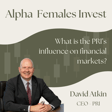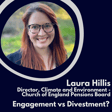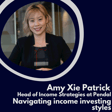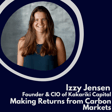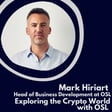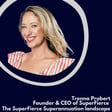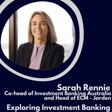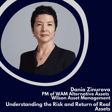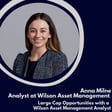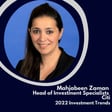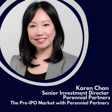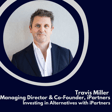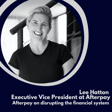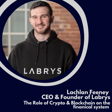Partnership with WIBF Announced
00:00:03
Speaker
We're excited to partner with Women in Banking and Finance, also known as WIBF, for 2022. WIBF is a not-for-profit membership association aimed at increasing the representation of female leaders in the banking and finance sector. WIBF provides courses, events and mentoring for females in finance.
Alpha Females Invest Podcast Introduction
00:00:22
Speaker
To find out more and become a member, visit www.wibf.org.au.
00:00:32
Speaker
Welcome back to the Alpha Females Invest Podcast, two females working in the finance industry searching for alpha. My name is Emily. And my name is Clooney. And together we bring diversified perspectives from the buy and sell side of the finance world. As usual, any information discussed in this podcast is not financial advice.
00:00:51
Speaker
All opinions reflect those of the individuals, and this podcast is for educational purposes only. You should always read the PDS and talk to a financial advisor who can consider your personal circumstances before you invest.
Guest Introduction: Alexandra Clooney's Ross
00:01:04
Speaker
Today on our show, we welcome Alexandra Clooney's Ross, who is the portfolio manager for Artesian's Clean Energy Climate Tech VC funds and the Female Leaders VC fund.
00:01:16
Speaker
She is also the co-host of Artesian's Art House podcast. So we do have another podcaster in the company today. Alexandra also has a Bachelor of Commerce from the University of Sydney and a Master of Business Law from the University of New South Wales.
Career Blunders: Alexandra's Embarrassing Moment
00:01:31
Speaker
Welcome to the show, Allie. Thank you so much.
00:01:33
Speaker
So I'm not sure if you've listened to a couple of our podcasts yet. We assume all our guests have, but we always like to kick it off with the same first question. So could you please share with us your most embarrassing career moment? I actually was thinking about this last night in my reformer Pilates class and actually almost fell into the pit of the reformer. I know.
00:01:58
Speaker
I was like thinking my embarrassing moment going, wow, I've just had an embarrassing moment in this class and everyone turned around. I mean, I was listening to a couple of the ones you guys had. I mean, the one when I started Artesian, I was looking after like our investor reports.
00:02:14
Speaker
And I always, when I had to kind of upload the report to the system that then would send out, I was so diligent. And once the old report stayed on and the new one didn't upload, so I sent a whole bunch of investors the old report. And then we started getting all these questions coming through that then all the partners were linked to being like, why is it this number and whatnot? And I think
00:02:36
Speaker
at the stage I was in my career I thought that was like a really big deal and I was so embarrassed but it was easily fixed but at the time it was a big deal so I think that's probably I've had many a time of accidentally sending an email to the wrong person and things like that but yeah I've learned my mistake I guess.
00:02:54
Speaker
Yeah, it's so funny. It just really shows you everyone can make a mistake and it happens. And even though it seems like the end of the world, it definitely isn't. No. And I was also at Reform of Pilates yesterday, next to an ex-colleague. So if that happened to me, I would have been extremely embarrassed. It could have been a worse, embarrassing moment as well.
00:03:13
Speaker
So, Artesian is such a great
Artesian's Investment Strategies
00:03:17
Speaker
firm. I've been hearing and reading and seeing it everywhere. It's a global alternative investment manager and has about $1 billion in funds under management. And you guys are also a certified big corporation, which is fantastic. Can you talk us through a little bit about what Artesian does? Yeah, so as you sort of mentioned, we're an alternative investment manager. So,
00:03:36
Speaker
There's a couple of sides of our business. So we have a fixed income business, we have a venture capital business, and then we have a venture capital as a service business where we're actually working with corporates in the innovation ecosystem. But the two main products we have is sort of that fixed income side and the venture capital side. Across all of our products, we have a bit of an impact lens.
00:03:58
Speaker
So for example, on our debt side, we have a high impact green bond fund and a green and sustainable bond fund. And then on the VC side, we have, as you mentioned, a climate tech fund. We've got an ag and food fund, a medical tech fund, and our recently launched female leaders fund. I work as part of the investment team on the venture capital side of the business. And really on that side, we're focused on investing in early stage companies, solving major problems.
00:04:27
Speaker
That's really interesting, Allie, and I think the venture capital side is a bit more of an unusual, I guess, career path than what we've previously heard of in this podcast. So I'd be really keen to understand, how did you actually get into VC to begin with? Yeah, so I was doing my undergrad and I wasn't really sure what I wanted to do. I'd been sort of
00:04:51
Speaker
researching innovation and regulation and how that sort of impacted things. I took a bit of time off. I went away for six months and then I came back to do my masters and I started doing some internships at corporations in their innovation firm. I'd also actually before this was working in like a range of different news outlets. So I was like doing a bit of the journalist thing. I really liked the idea of kind of understanding a story, being curious about a story. And I think that kind of comes
00:05:18
Speaker
links really well to VC, because you're understanding the founder's story, the founder's journey, why they're passionate about that company. And then while I was doing my Masters, I applied for an internship at Artesian. So I really started, you know, from the get-go out of uni in venture capital, and have been working here for the last sort of five and a bit years now, and absolutely love it. I've, you know, met some incredible founders.
00:05:43
Speaker
the things that these founders are doing and the solutions and the technologies that they're creating are just unbelievable. So being really fortunate. It is a little bit of a random career path to start with. It's definitely becoming more and more prominent and people are more and more interested in this space and working in the startup ecosystem, which is fantastic because I think it wasn't really entrepreneurship. It wasn't really talked about that much, particularly when I was in high school or when I was at university.
00:06:10
Speaker
whereas now it's starting to gain a lot of momentum. And it is an incredible career path for a lot of people and a lot of women.
Female Leaders VC Fund
00:06:18
Speaker
Yeah, I love to hear it. And speaking of women, you also run the Female Leaders VC Fund, and you've got 100 million seated in that fund. And the whole goal is to invest in female-led startups, which I think is fantastic. There's definitely not enough support for female-led businesses.
00:06:36
Speaker
Why did you create the fund? I guess what was the problem you were hoping to solve by investing in this area? Yeah, so I guess when you look at global data, startups with mail-only founders receive more than 85% of the global VC funding. Globally, 95% of VCs are mail.
00:06:54
Speaker
and male founders and employees own 89% of total startup equity. Conversely, when we look at female-only founders, they're receiving less than 3% of global VC funding, and the average deal size is much less. Then the female founders and employees own only 11% of the total startup equity.
00:07:16
Speaker
There is this gender bias around female founders and entrepreneurs. A lot of the decision makers are men. This causes a lot of biases that are not necessarily intentional. And it means that some sectors are overlooked because the problems that female entrepreneurs are solving maybe don't relate to the investors. So we really wanted to create a fund that would lead rounds for female founded businesses. And we not only look at
00:07:44
Speaker
You know the founding team we also look at the executive level and the board level as well as that company's policies to understand if they actually have. Diversity policies or if they don't we can help them do that as well to ensure that you know not only are these female led businesses but also women are getting access to the equity.
00:08:04
Speaker
in these companies because that's how a lot of the time sort of wealth is generated. So there's a lot of flow and effects and I think we'll talk a little bit about the impact further along. But yeah, that was really, we didn't see that there were many funds in the world doing this and definitely not many funds in the region. So we felt like there was really a gap in the market and we wanted to provide alpha for our investors.
00:08:28
Speaker
I love the concept, Allie, and I think it's a great initiative. I think some of those stats are really eye-opening. You said males receive more than 85% of VC funding. The male founders often own a large portion of the startup equity. For females, the average deal size is a lot less. I guess given all those stats, do you feel that that is currently in this environment limiting your investment universe, or do you just think there's this huge pool that is currently untapped?
00:08:55
Speaker
I guess second to that question, you know, we read up a little bit and sort of seems like a 20% annualized return sort of comes from this. Is that different to your other funds or is that relatively, I guess, even across the board?
00:09:08
Speaker
So that is the same target across all of our VC funds. So it's not a reduced return. Lower standard. No, I mean, we always get asked that. No, absolutely not. In fact, research shows that women are actually better at hitting their stats and hitting their projections and sticking to what they've said. So in many ways, this fund could actually outperform that target. I think in terms of the investor universe,
00:09:35
Speaker
This fund can't solve all the problems in the world. There are, obviously, problems at the education level. There's problems with women in STEM. There's lots of different problems to solve. The more that we stimulate the ecosystem, the more female entrepreneurs there will be as well. Really, we feel like this is more of an activation and selective attention problem.
00:09:58
Speaker
Once we announced this fund, we had a huge inflow of female founders. They weren't necessarily all the stage we were looking at, but what I've actually found is that often female founders want to have a coffee and hear what we're looking for and where they need to be.
00:10:14
Speaker
We've really started relationships early with female founders, you know, slightly earlier. The funds focused at Series A and B, so, you know, seed stage companies. We've really engaged with networks. It's a regional fund, so we're focused on Southeast Asia, Australia, New Zealand.
Engaging Female Founders
00:10:29
Speaker
We've engaged with different, you know, networks and different investor groups in that globally. So we're definitely not seeing that it's limiting our investment universe. It's more that
00:10:40
Speaker
you do have to do the work to engage it and motivate that ecosystem and ensure that you're finding those female founders. Often as well, female founders might not have the same network, so being able to have those cold intros and having office hours and having people have coffees with us has really helped as well ensure that we have a really strong pipeline of deal flow, not even immediately, but within the next 12 months as well.
00:11:08
Speaker
We're really talking to companies of all stages. And as I'm on this podcast, if there are any female founders out there, please reach out to me on LinkedIn. We're always willing to have a chat.
00:11:17
Speaker
Ali, I think Alpha Female's Invest is open to investments, if you'd like to get around us. We'll have a conversation about this after. Okay, we'll talk valuation. Very punchy idea. So you talked a little bit about the impact for supporting female entrepreneurs, and we can touch on that a little bit more, but also the key sectors or themes that you see more prominent for female-led startups. Is there a bit of a sector bias there?
00:11:46
Speaker
Yeah, so we're definitely seeing a skew currently. And look, these themes often change, even with climate tech. And we'll talk about that a little bit later. But we see different trends come through the market. But at the moment, I'm seeing a little bit of a skew towards health tech. Then all the others are pretty much equal. All the other sort of sectors are pretty much equal.
00:12:08
Speaker
I'm not sure exactly why. I mean, a lot of the female founders, some of them are actually scientists or doctors themselves. So we're seeing sort of a lot of women who have that domain expertise in that space. We probably don't have quite enough of a sort of sample size yet to say that is or isn't. But, you know, within a year's time, we'll have a better understanding of that skew. We're also obviously seeing a lot of companies in, you know, fem tech, sex tech,
00:12:37
Speaker
different sort of products for women, as well as a lot of e-commerce, but there's still a lot of B2B SaaS, there's climate. So we're seeing a lot of different sectors in the companies that are applying to the fund.
00:12:50
Speaker
That's really interesting, and I guess given the current market dynamics that we're in at the moment where tech seems a little bit out of favor, it's great to see that there are still so many different ideas that are up and coming and that there is VC to back them. You touched on it just before, saying you invest relatively early on in the piece. I guess what stage are you making that investment in the company journey?
00:13:12
Speaker
They've got an idea and they think it's feasible, or do they have to be generating some revenue? So that would depend on the fund. So Artesian has a number of different funds. Most of our funds are a slightly earlier stage, but the Female Leaders Fund is Series A and B. So I might just focus on that first. But Series A typically means that company has some form of product market fit and is generating revenue.
00:13:40
Speaker
Hard for me to even say that that's 100% what it is at Series A because some companies might be medical technology or really deep tech. And these companies might be at Series A, but their revenue compared to a B2B SaaS is going to be very, very different. So that's very general, but typically they do have revenue and they've got product market fit and the fundraise is to continue to develop their product.
00:14:08
Speaker
add new features, maybe better the algorithms depending on what it does, as well as maybe expand overseas and continue to kind of service their pipeline of customers.
00:14:21
Speaker
That makes sense. Then when you do come across one of the entrepreneurs or one of the businesses that they're looking for investment, what are the key factors which you will decide on whether to invest or not in that business? I guess we firstly look at the founding team.
00:14:38
Speaker
Why is this founder or why these founders? Why have they started this business? What's their connection with the problem? What was their previous experience? If any, what have they done to date? A lot of the traction, where we're talking about traction, revenue, customers, all of those points, that's really their ability to execute and their ability to
00:14:59
Speaker
grow the business. So it's early days of that sort of facet. So we typically first look at the team and then we're looking at the problem. Is this actually a real problem? Is it a nice to have? Is it a burning issue? What's the market? How easy is it to get to those customers? We then would look at their solution. So is it differentiated? Who are the competitors? Is it completely the same to, you know, Twitter?
00:15:27
Speaker
Is it a new Twitter that's a carbon copy of Twitter? Or is there something really new and unique about it? Or do the algorithms ensure that they're reducing biases? Whatever. We look at that solution and how it compares to what exists already in the market, competitors. Then I guess we'd look at their use of funds. How much are they raising? Where do they think that gets them to? And then we're looking at
00:15:51
Speaker
How realistic is that? What have they done previously? What is their sort of milestones that they've hit and what are their future milestones as well? So that's sort of very sort of overall initial review. We're sort of ticking those boxes.
00:16:07
Speaker
So given all those different categories in terms of determining whether an investment is one for you guys at Artesian, how do you then value that private business, especially when it is such at an early stage? Can you look at comps available if there is a similar technology product on the market? I guess for those that there isn't, that makes it very difficult. So could you just walk us through how you go about that?
00:16:31
Speaker
Yeah, so I guess it does depend on the stage. So companies that are sort of pre-seed or seed stage, they might not have any revenue. So because we see so many deals, we know, you know, approximately where it will sit in the market and compared to other
Startup Valuation Methods
00:16:47
Speaker
similar technologies or technologies in the same space, you know, where they're kind of raising. So there is that sort of comparable element to it. Later on, when they are generating revenue and you know, you can see that they've got a growth rate, you kind of factor in where their level of revenue is, what their growth rate is, where they're going. And that's where you start to look at potentially some multiples. And then the multiples in the market will depend on lots of those things like the LTV, the CAC,
00:17:14
Speaker
their growth rate, their customer attention, all of those things, as well as that kind of skews up and down, I guess, with the market. So the public markets are influenced by the public market, but it's typically a little bit delayed. So that's where those kind of multiples start to come in. And I guess,
00:17:33
Speaker
One of the things that i always say to our startups and when we're looking at a new business in terms of valuation the entry point. Is only relevant in relation to the exit so where you think this company can exit how you think that they're gonna exit and what valuation they're gonna exit out so.
00:17:51
Speaker
you know, if you're investing at 10 million or 20 million, and you think that company is definitely going to be a billion dollar company, it probably doesn't matter if you're skewing up or down a couple of million. What does matter actually is when they look to raise again. So these companies typically raise in 12 to 24 months, depending on how they go. And if that company has raised an evaluation that's too high,
00:18:17
Speaker
And then multiples might have skewed a little bit or they might have changed a little bit because of what's happening in public markets. And then they've grown into that valuation. But 18 months time, it's a different scenario. That's where they can get into a tricky scenario because the market might say, right, well, now.
00:18:35
Speaker
that's a little bit too high and then it's hard for them to raise money. So there is this sort of balance. There's a little bit of an art to it as well, but that's how we kind of look at, we look at more the opportunity. We're looking at the market size, how competitive they're going to be, how they've been able to execute. All of those facets come into the valuation as well. It's not as sort of technical as it is in private equity, for example.
00:19:03
Speaker
Yeah, you definitely don't want to go back to market raising money on a backwards valuation that doesn't help anyone involved. No. Like the other thing is when I was talking about the founder, like you might have a founder who's built a multi-billion dollar business and this is their second business. Their business is going to be valued higher because they've already shown their ability to execute on something else. So that's very much a soft
00:19:27
Speaker
you know, consideration. So those pieces do impact how you're looking at the whole business. Yeah, absolutely. So then you've got kind of what you think the company is worth and you have a potential entry point. So then what is the structure of your investment process? Do you have an IC or investment committee that then governs what you actually put money towards?
00:19:51
Speaker
Yeah, so we typically, you know, we meet with these companies, we determine pretty quickly if it will fit one of the mandates of our fund, then we kind of dig in to understand, you know, is it a company that we'd like to take to due diligence? Then we sort of run our due diligence process, we might hone in on different areas depending on what they're doing. And that's over a period of time, we might bring in, I might bring in our CTO to kind of have a chat about their software or
00:20:19
Speaker
If it's a deep tech, I might have somebody in our network who's an expert who can have a look at that particular type of technology. And then once we've kind of run through that process, we have an investment memo and then we pitch it to our investment committee. The investment committee is made up of some partners, some externals, depending on which fund it is.
00:20:39
Speaker
because each fund has different LPs, different structures and then typically that portfolio manager is pitching the business. They've put together how much valuation, what equity stake we're getting, why now, why this sector, why this founder and you almost become like the founder pitching the business to the investment committee. That sounds like a really thorough process that you guys go through and I think you know that's critical at this early stage of an investment piece.
00:21:09
Speaker
You spoke on it before you just touched on it you mentioned, you know when you exit an investment What is typically that exit point for an investment for you guys and does it vary quite significantly or is there a certain stage?
00:21:22
Speaker
Again, it varies. It's hard. There's not one size fits all for startups. So we've had exits in the public market. We have had exits through trade sales. And then we've also had scenarios where that company's remained private and they've raised later rounds of funding that might be in the US or Europe or remained private in Australia. And we've taken liquidity because we see that
00:21:48
Speaker
we can hit some good returns. So it really depends on the business. Yeah, and it also depends on the stage that you've got in. So if you've got in really early, you can actually do liquidity and some of those later rounds. If you've gotten in a little bit later, you might be waiting for that trade sale or that listing. So it very much depends on when we've entered and what's sort of happening with that business, that sector as well.
00:22:11
Speaker
And given that you are primarily a VC fund, but maybe you see more value post listing, would you hold onto a position in the public markets or would you typically sell out regardless of your outlook for the business?
00:22:28
Speaker
We typically at that point sell out. There's always different elements like with escrow and all of those sorts of points, but we are a private fund manager. So our LPs can manage those listed equities in different funds. So we're not here to manage listed equities for our investors. So when we can, and when we see that there's that return,
00:22:52
Speaker
we will take liquidity because that's the point where the information is out in the public. So we don't have a competitive advantage anymore where we've got the relationship with that founder. It is listed. So our LPs can kind of manage that listed investment. I feel like it's really interesting talking about this sort of from a high level perspective, but are you able to just give us an example of a typical sort of recent investment
00:23:18
Speaker
and perhaps a typical return profile of that type of investment? Yeah, so I've recently invested in sort of a health tech business. We're in the process of kind of finalizing that investment. When we look at similar companies in the market, we can see that there's clear visibility for a sort of a 10X return on that. So over the course of
00:23:40
Speaker
the next three to four years, subject to them hitting what their forecasts are, we can see that there is visibility for a 10x return. This particular company, I think, is most likely to be acquired. There's a lot of acquisition going on in the space. However, there are some listed companies as well, and so you can see beyond that 10x, there is an ability for that company to go
00:24:05
Speaker
50x and list as well. Obviously that would take slightly longer. So yeah, we're typically looking for that sort of 10x return when we're investing. And Ali, we caught up before this podcast to kind of chat a little bit about, you know, your job. And one of the things we spoke about is that a lot of it involves going out there and networking and meeting entrepreneurs to just get exposure to those opportunities. Is that your primary means of finding deal flow?
00:24:33
Speaker
Yes, so we find deal flow in lots of different ways. So we have direct cold inbounds. So we have companies reach out to us via LinkedIn, via Twitter, via email sometimes. We also get recommendations from our founder alumni. So our founders, you know, they're out there in their network, in their specific sector.
00:24:53
Speaker
They know a lot of great founders, so we often get recommendations. We also get recommendations from other VCs or angel investors or the corporates that we're working with as well. I've got companies in the portfolio that I met through an event and one of them I met through a
00:25:13
Speaker
climate tech speed dating event and we've invested in there you know three or four times now so you often do go out there and the networking is not just with the startups but of course that's really important but like other ecosystem as participants as well so that you can share deal flow you can co-invest you can see you know a variety of pipeline opportunities and then also we you know go out and try to scout
00:25:38
Speaker
specific companies as well, particularly when we're interested in a sector, you know, we'll cold reach out to a company and say, Hey, we'd love to chat to you. Don't know if you're raising, but let's start a conversation. That's really interesting. And it sounds like quite an exciting job in the sense that you're really going out and bringing the business in the door and backing that business. Yeah, I think it's unique in that way, because there is a lot of relationship building with
00:26:04
Speaker
all the governments, co-investors, corporates, accelerators, and then of course the founders themselves. So yeah, it is really exciting. I love talking to the founders and I love learning about the founders. They're so passionate and interesting and such experts in their field.
00:26:24
Speaker
Well, it sounds like you're pretty passionate too, Allie. And, you know, even though you're going to climate tech speed dating events, I'm not going to ask you to be held on that. But, you know, clearly through that, I'm guessing you look at climate technology. Obviously, with sort of the net zero emissions commitments being made globally, there's a pretty big
00:26:43
Speaker
incentive to reduce a company or country's emissions profile.
Net-Zero Driven Tech Trends
00:26:48
Speaker
Have you started to see any tech trends that are popping up because of that regulation and government reform that we're seeing? Yeah. We've been investing in this space for the last five years.
00:27:00
Speaker
Our fund has seen a few different cycles and a few different trends. We've gone through the hydrogen phase. We're seeing a lot of carbon sequestration. So how can we actually take that carbon and put it back into the soil? Or how can we use that carbon in new ways? Can we create it into
00:27:19
Speaker
renewable methane or are there other ways to use that? There's still that big trend towards EVs, so that comes across through battery technologies as well. How can we increase the energy density of batteries so that
00:27:34
Speaker
we can reduce the cost of EVs or we can drive them for longer, all of those sorts of points, as well as, you know, softwares around EVs or EV charging stations. There's also been a lot of trends towards measuring emissions. So how can a corporate measure
00:27:51
Speaker
their scope one, two, and three emissions. And I think that there's, everyone's really excited and really wants to reduce their emissions, but then it's very challenging when there's complex supply chains. So a lot of corporates are looking for these, you know, softwares or these new technologies to help them with this. So we're seeing that pop up a lot as well. Yeah, I think those are a lot of the trends we're seeing.
00:28:16
Speaker
in the space. I love the climate stuff. It's super interesting. The founders are always very technical and very passionate about what they're doing. Yes, and also recently I've started to hear a bit more about scope for emissions, which is all about the emissions avoided from your technology or your business process compared to traditional ones, which is such an interesting way to phrase
00:28:40
Speaker
what I would call avoided emissions as a new scope for so that's really interesting that's happening that space and what I also like to see is that you were seated by the CEFC or the Clean Energy Finance Corporation for a clean energy fund and I saw that it's investing in areas like biofuel water and waste alternative energy all of which are really topical themes
00:29:01
Speaker
Are you seeing more and more opportunities in this space? And I guess even more importantly, an attractive return on investments, because we have seen a little bit of a premium for these types of technologies, given they are demand. Are they still attractive investment opportunities?
00:29:15
Speaker
Yeah, so I think the space has changed a lot in the last five years. So when we first started investing, there was interest from VCs, but it wasn't as much as there is today. And I think often that was because a lot of these technologies are hardware or deep tech. And that's just because of the nature of the problem. Yes, there are, you know, softwares that do the carbon accounting. There's softwares that allow for
00:29:39
Speaker
energy efficiency in buildings. There's lots of different things, but generally speaking, if you're trying to generate renewable energy, then you have to store it, then you have to transport it, and then you have to use it. So there were technologies across this whole value chain and with a lot of them being relatively capital intensive, they weren't traditionally sort of that attractive to VCs. I think as we're seeing this become more and more of an imperative problem or
00:30:09
Speaker
It always was an imperative problem. I guess more and more interest and people are more and more active about the problem from the government, corporates and then obviously individual stakeholders as well. We're seeing more money flow into the space and that inherently means that there's more
00:30:28
Speaker
Deal flow and there's more innovation and you know, there's more technologies being spun out of universities and things like this. So we're definitely seeing more deal flow in the space. And we're also seeing attractive returns on investment. These companies can be really, really big when they solve these massive problems, but there's often
00:30:51
Speaker
at the early stage, more technical risk. So it's more around the technology and scaling that technology up. And I think they say there's like four valleys of death with climate tech, it's like spinning it out of the lab, then it could die, then getting it to the pilot plant, you know, then they've got to kind of
00:31:06
Speaker
show that that tech works, then they've got to get it to commercial, then they've got to sell it. So there's a lot of different sort of proof points for climate tech that makes it harder to invest in. But the ones that win, there's a massive market opportunity and they really can be massive game changing technology. So
00:31:24
Speaker
There's seriously attractive ROIs as well. That's definitely Emily's forte, that whole spectrum and space. But it is so interesting to hear all the different initiatives that have been put in place in those areas. And every time I do get a snippet of it, you do have to step back and go, wow, this is really the way forward. And, you know, I think we are a bit behind the times.
00:31:45
Speaker
But Ali, look, I've really enjoyed today's episode and I know Emily has too. It's great to hear there are companies such as Artesian backing young startups. I love the concept of the female-led fund and the fact that there aren't many globally. I think that just provides such a fantastic platform for increasing that future investment.
00:32:05
Speaker
especially around the female angle. So you're also very impressive yourself and it seems like you've come up the ranks pretty quickly, which we always love to see. So a final question for you. I'd love to hear what is your top career tip?
00:32:17
Speaker
I think try to drown out the noise and focus on what you want to focus on or what you're doing. I think it always looks like everyone's doing something better than you or that everybody's doing really well. I don't know, my personality type is more like, oh, I'm not sure, am I doing okay?
00:32:37
Speaker
I think I've really learned to just like focus on what I'm doing and do that well and stay in kind of my lane and move forward with that. And I think it's really easy in the world that we live in with social media, not only like personally, but also from a career perspective, like Twitter and LinkedIn to get a bit, you know, not sure if you're sort of on the right path.
Career Advice: Avoiding FOMO
00:32:58
Speaker
I think just stick to your guns and you'll end up where you need to end up and your success will come.
00:33:05
Speaker
It's like career FOMO almost. Yeah, I agree. I think it's, it's really hard. People always say about like Instagram, you know, do you think I'm like Instagram, whatever. I'm like LinkedIn and Twitter. I'm going, there's a lot going on there. So I think, um, yeah, I think just don't have FOMO. Like everyone's on their own path. Everyone's like doing their own thing. You'll do a good job if you just focus. The grass isn't always greener on the other side. A hundred percent, a hundred percent.
00:33:31
Speaker
Well, Ali, thank you for that great career tip, and I think it's one we haven't had yet. So it's always super insightful speaking to people like yourself, as you mentioned, and you gave a plug to it before. But if there are any female founders on listening to our show, please contact Ali. I know she'd love to get in touch.
00:33:49
Speaker
And if you want to find out a little bit more as well, the Artesian website is on the notes below our podcast link. So thank you, Allie. It's been great talking and have a great day. Thank you so much, guys. Speak soon. Thanks, Allie. Bye.
Conclusion and Social Media Invitation
00:34:04
Speaker
Thank you for listening to the Alpha Females Invest podcast. If you liked this episode, we would love your support on Instagram. You can find us at Alpha Females Invest. You could also leave a podcast review, but most importantly, please keep listening. See you next time.


